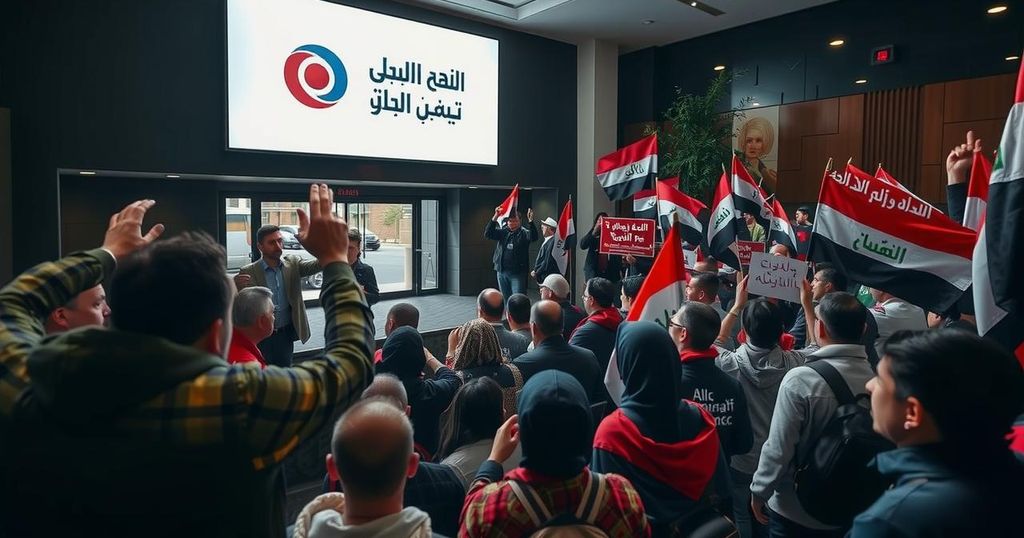Pro-Iran Protesters Attack MBC Offices Following Controversial Report in Iraq
Supporters of pro-Iran groups vandalized offices linked to Saudi MBC TV in Baghdad, reacting to a report that labeled their leaders as “terrorists.” They damaged property and ignited a fire during the attack, which was prompted by the broadcast focusing on regional terrorism. The Iraqi government, influenced by pro-Iran elements, faces challenges in navigating these tensions as calls for stronger actions against the broadcaster emerge.
In a recent incident in Baghdad, a mob of 400 to 500 individuals, identified as supporters of pro-Iran militia groups, violently attacked the offices of a production company associated with the Saudi television channel MBC. This act of aggression occurred early on a Saturday morning, following the broadcast of a controversial report by MBC that labeled several Iran-backed militant leaders as “terrorists.” According to sources within the Iraqi Interior Ministry, protesters damaged electronic equipment and set fire to part of the facility before police arrived to suppress the disturbance and disperse the crowd. No arrests were reported at that time, although a significant police presence remained in the area to prevent further escalation. The uproar was ignited by the MBC program’s focus on terrorism within the region, which included references to notable figures and groups aligned with the Iranian Axis of Resistance, such as Hezbollah, Hamas, and various Iraqi armed factions. Among those mentioned were deceased leaders like Hassan Nasrallah and Ismail Haniyeh, connecting the violence to the ongoing conflict between Israel and Iran-aligned groups. This incident reflects the broader tensions between Iran and Saudi Arabia, which have historically been rivals yet have pursued diplomatic rapprochement as of 2023. The ongoing conflict in Gaza has complicated Saudi discussions regarding potential recognition of Israel, leading pro-Iran elements in Iraq to escalate their reactions toward perceived insults against their leaders. Iraqi lawmaker Mustafa Sanad condemned MBC’s reporting as an affront to resistance movements across the region, asserting that stronger measures would be taken against the broadcaster, including attempts to revoke its operating license in Iraq.
The tensions between Iran and Saudi Arabia have historically influenced the geopolitical landscape in the Middle East, with both nations backing opposing factions in various regional conflicts. The current dynamic has been intensified by the ongoing war in Gaza, which has drawn in various groups linked to Iran and resulted in a marked increase in hostilities between these factions and Israel. MBC’s report that offended pro-Iran groups not only rekindled local animosity but also showcased the fragile state of freedom of expression in the context of regional politics, wherein media outlets can provoke severe reprisals from influential armed groups. This incident underscores the delicate balance Iraqi leadership must maintain as they navigate both domestic pressures from pro-Iran factions and international relations with neighboring states.
The attack on the MBC-linked offices in Baghdad underscores the perilous environment for media entities operating in politically charged regions, particularly when reporting on sensitive subjects. As pro-Iran groups react violently to perceived affronts, the incident draws attention to the broader regional dynamics between Iran, Saudi Arabia, and various militant factions. Furthermore, it highlights the complexity of the Iraqi political landscape and the ongoing struggle for control and representation among differing factions within the country.
Original Source: www.voanews.com








Post Comment